October 4th, Philadelphia Police Station, 750 Race Street, Philadelphia, from 3:00 - 5:00 pm
Photographs by Annie Lesser
When my photographer, Annie, and I arrived at the police station, we discovered fencing had been put up around the Roundhouse, the Brutalist-style headquarters. I’d seen this before. Law enforcement was not going to let anyone come in on the official side of the building and this was a very bad sign. When police feel the need to barricade themselves from their own community, that signals a deep fear state. I wondered whatever happened to police being there to protect us? Whatever happened to the peace officer? At the front entrance was a statue of an officer with a rescued child in his arms, signifying safety and love. Kneeling here would have created an ironic juxtaposition, yet because it was obstructed, I was forced to do my action near the backdoor.
As Annie and I walked towards the rear, I told her she should move behind-between-around the cars in the parking lot, and to remain as hidden as possible; all the while, get in close when you can, as often as you can so we could get some good shots. It was a bad idea. It was an impossible idea! We separated, and I walked towards the back entrance-way, laid down my cape, and began to kneel.
Not three minutes passed before a Black police officer arrived.
“Are you okay?” she asked, “You’re doing a lot of digging under there.”
I said, “I’m good, I’m good.”
I was trying to locate my phone deep in my bag. I’d planned to set an alarm for 5:00.
Then she said in a strained, high-pitched voice, “You’ve got nothing in your bag?”
“No, you can check it out if you want.”
“No, no, I don’t want to check it.”
She turned her head right and radioed to another cop something about my kneeling, then turned back to me with a voice of incredulity, “I thought you were sitting on a crate…you’re on your knees?! How long are going to do that?!”
“A couple of hours.”
Even as she stood around and appeared relaxed, she was watchful.
Not much later, another Black officer approached me and he had on a stark white shirt. Not wearing any type of uniform, he looked like a caterer or a special agent.
“Hello.”
“Hello.”
He stood about two feet away, wearing a mask partially over his mouth, and said, “We work with Civil Affairs…what we do is…”
I interrupted him, “Could you cover your nose please…when you’re this close.”
He didn’t cover his nose.
He said, “We’re trying to help you.”
I repeated, “Please cover your nose when you’re less than six feet away.”
He covered his nose. He said, “Okay, what we try to do is, we try to help protesters. Is there something you’re trying to say here? Or do you want somebody…” (inaudible now because he has a mask on).
His phone rang, and he began talking to someone on the other end. “Yes, there’s a person here with a cape.”
“Your name is not Jennifer is it?” he asked me.
“No.”
“No, not Jennifer.” he repeated into the phone, then he hung up.
“If you read the cape, you’ll understand what this is about.” I told him.
“It would be better if we heard it from you.” he said.
“No, I don’t think so.” I said.
“So, you don’t want to talk to me?”
“I would prefer if you read the cape first.”
A long dark silence passed.
I said, “What’s your name?”
He said, “I’m Officer Ward.”
I said, “Okay, nice to meet you.”
He walked behind me, and looked at the cape.
“Oh God,” he said, and I cringed. Then, he came back around and stood in front of me.
“But I still don’t understand what you’re trying to do.” He said, astonished.
“Did your family” -- again, it’s inaudible because of the mask. “Okay, is he still a police officer?” he asked me.
I shook my head no.
“That’s a huge story. I’d like to help.”
“Then I can stay for a while.”
“I’m trying to figure out what it is your trying to relay. You know it seems like you don’t have any support here.” he said.
“I don’t mind.” I said.
“So, what are you trying to accomplish?” he asked.
“I’m not trying to accomplish anything.”
“Okay, what are you trying to express?”
“I just want people to read the letter.”
“Okay.” he said.
“That’s it.” I said with exasperation.
“There aren’t too many people here that are going to pay too much attention to this.”
“There’s a lot of police here.” I said.
“Well, they’re not going to pay attention to this.” he said.
“How do you know?”
“I’m a policeman.” he said.
“You looked at it!” I said in anger.
I could feel my body getting tight. He had a clipboard in his hand, with paper-work on it, and I could tell he needed to fill it out. I could see other police had arrived and were watching me. I assumed that Officer Ward had to give answers to his boss about why I was here, and I didn’t have any information to impart. Also, he had just made assumptions about all police being the same, and not having any interest in my cape. I wanted to communicate my story, but he was telling me in so many words…ain’t no use in trying, no police are going to look at it. I wondered if he was right. I felt a long sigh escape from me with the thought that he probably was.
“Like I said, I’m here just trying to help you,” he iterated once more.
I didn’t feel helped by him, whatsoever. He had signaled to other cops to stand by and watch me. I’d imagined that it was too hard for him to understand that I don’t have a particular agenda. It seemed simple to me, and I felt frustrated he hadn’t taken in my story with any real emotional connection, or so it seemed.
“I’ll be here for a little while, and then I’ll leave.” I said.
“I don’t have a problem with that, but I’m trying to help you.” he said.
“Great.” I squeaked out with defiance.
By this time, the two other cops around me felt like a heavy presence. They were looking and pointing at me, radioing others, and pacing in circles. It seemed they wanted things under control, because that’s what police do. My unexpected shape had caused a stir, if not an alarm, inside the police station.
I also knew that I wanted control too, because while I was growing up I had to be under control all the time. By the age of six, I’d become a watchful, and strategic child. It was not possible for me to bring my needs to my father. I had to skirt, shift, hide, tip-toe, run, be silent, force a smile, and, at the same time, contain real joy in order not to be humiliated by him. Cops do not like figures of authority and neither do I. Now I was facing three officers who really did not like me to be there, but I was going to insist that I had a right to kneel with my cape on the sidewalk. I felt a battle growing inside.
Time clicked on, and the officers continued their watchful vigil. One wore a classic blue, and white uniform, while the other dressed in regular clothing. The plain-clothes cop may have been undercover, but his gun was apparent, a reminder of his deadly power. Staring at me, his eyes were cold and hard as he leaned against the round concrete block sticking out of the earth. His arms were crossed for most of the time; displaying his ferocity. He meant business with his body, and I stared right back. Glares of heat shot out of my eyes, and then I’d look away, feeling anger, then shame. I didn’t want to be like that because it reminded me of when I had thrown mean looks at my father. It brought me too far back.
Officer Ward was more determined to find out what was going on, and why I was there. He had that paper-work to fill out too. Perhaps they were afraid my phone was a weapon? Maybe, they thought I was a suicide bomber? I couldn’t imagine being afraid all the time when something mysterious arrives in the world. Bad scenarios played out in my mind. How many times have we heard about someone being shot because a phone was mistaken for a gun. All too often, things go from 1-100 in a millisecond because of misperceptions. My body began contracting like crazy, my breath got short as my heart beat faster. Unexpectedly, I’d become very frightened.
They’d already kicked my photographer off the parking lot because the police cameras everywhere-every-which-way caught her behind the cars and she looked “suspicious.” Now, she was constrained to stand at least 150 feet away, behind a chain-linked fence, off their “private property.” I still didn’t know what they truly thought of me. The possibility that this could get out of hand started to sink in. I slowed my breath to calm my nerves.
Officer Ward had walked behind me once more, and suddenly he spread the bottom part of my cape open for others to read. I was surprised. This photo was taken from where Annie stood for most of my kneel-in.
Other officers looked on from afar.
Near 4:30 or so, the cops began to relax, and Annie was finally allowed to come nearer the station and take closer shots of others looking at the cape. In the meantime, Officer Ward had tried to convince me that I should seek therapy to help me with my trauma. While I appreciated his concern, I relayed to him that I’d been doing that for some time. Honestly, I almost felt annoyed by his suggestion. I’d already been working for decades to heal deep wounds; the last thing I wanted to hear was, “Maybe some therapy would help you.”
At some point, Officer Ward came back over to speak with me again. I could sense a fatigue in my body from having been monitored for over an hour and half and then, a sudden sense of relief arose as Annie was now in closer proximity. As he leaned in, I told him he could loosen his mask so I could hear him better.
He said, “One thing I wanted to tell you…in time, when you’re ready, you can always go to the Special Victims Unit and tell them your story. You know they would do something. They would look into it. That’s just so you know that somebody will look into this. And maybe there can be some type of resolution. We can do something for your mom, and your sister, and everybody. So please…just think about it. I’m really sorry to see you go through this.”
I looked at him and said, “I appreciate that.” And I did feel gratitude for his sincere care. At the same time, I felt resigned, and frustrated that our family hadn’t been cared for so long ago. If only is a bad set of terms, but there it was. Unexpectedly, I thought of my mother. She has watched and continues to watch Special Victims Unit, the T.V. show. She views the re-runs over and over and over. I have never seen the series myself, but her fascination with it strikes me as something large. I’m not sure she knows herself why she consumes the series so voraciously, but I wonder if my mother may still be in a struggle with the past, and there’s a need for a replay. Maybe she’s looking for a different ending.
I thought of how long ago all of this happened, and the years it’s taken me to not sink into bitterness or resentment, but that was not without a fight. And, I’m rarely all the way there. The course of my life has been out of my hands, mostly, and it is worth surrendering to the idea that what happens in our life is mostly not determined by free will. I am deeply grateful to all the people who have helped me heal to this point in time, where I can wear this cape and not feel ashamed.
One more time officer Ward came around to speak with me. He seemed less strident. As he lingered, I sensed something different in his demeanor. Finally he asked, “How much longer are you going to be here?”
I said, “Only till 5:00, which is just a few more minutes.”
He said, “You know I got to tell you"- - with a long pause - -“that letter reminded me of my family, that’s why I got in this business.” He lowered his mask further, looked into my face. “It really got to me, that letter.” he said. His voice broke, and his face contorted with pain. I was stunned, and right then, I sort of felt like a jerk. Not a terrible jerk; it’s just that I was surprised at how much sadness was suddenly right there before me. He’d been genuine in his wanting to help me all along, but it was hard for me to trust it. I didn’t know what to say. I was distressed and astonished that he made himself vulnerable with such frankness to me now. I simply looked at him, and was awed by his sorrow.



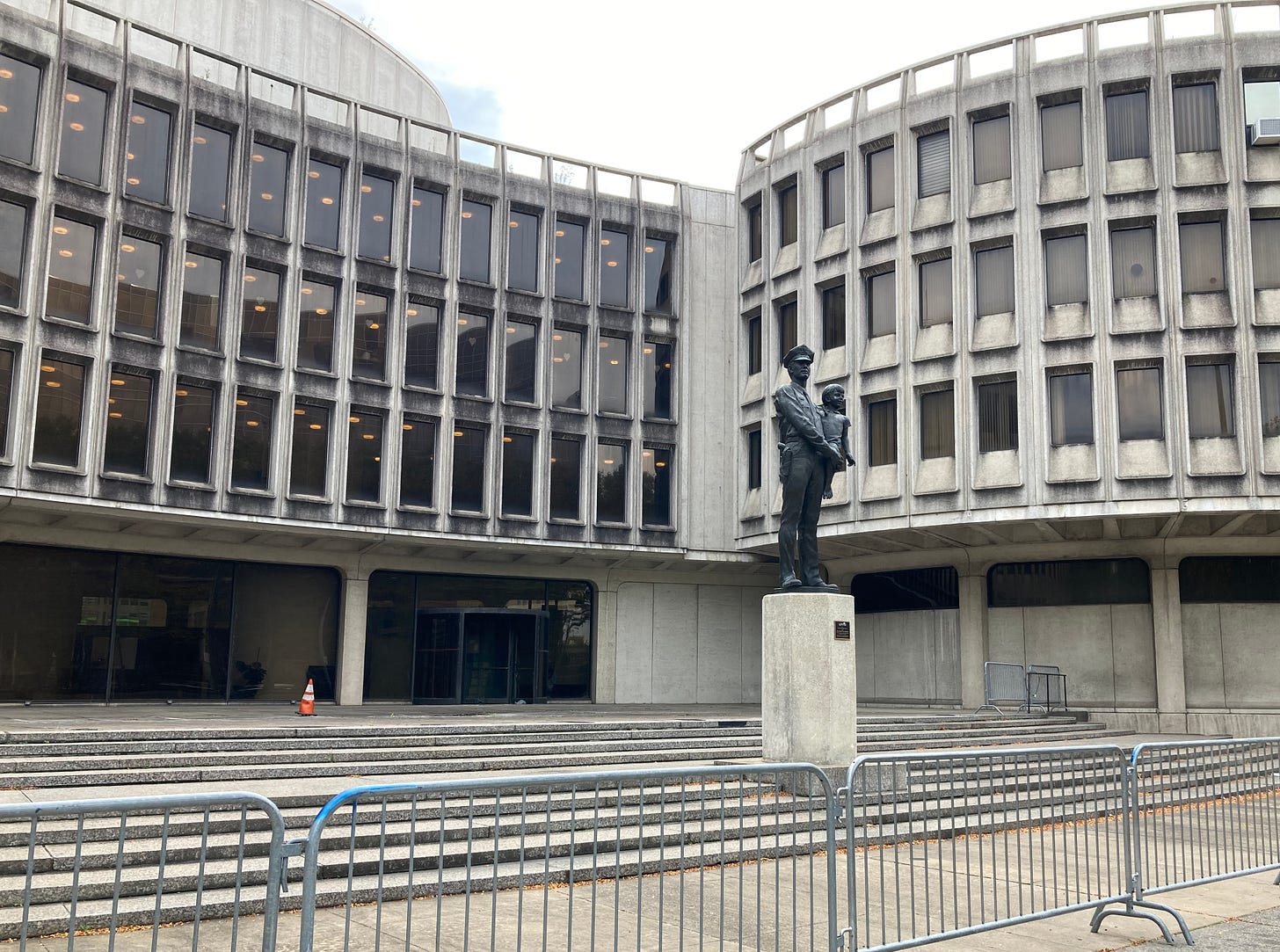



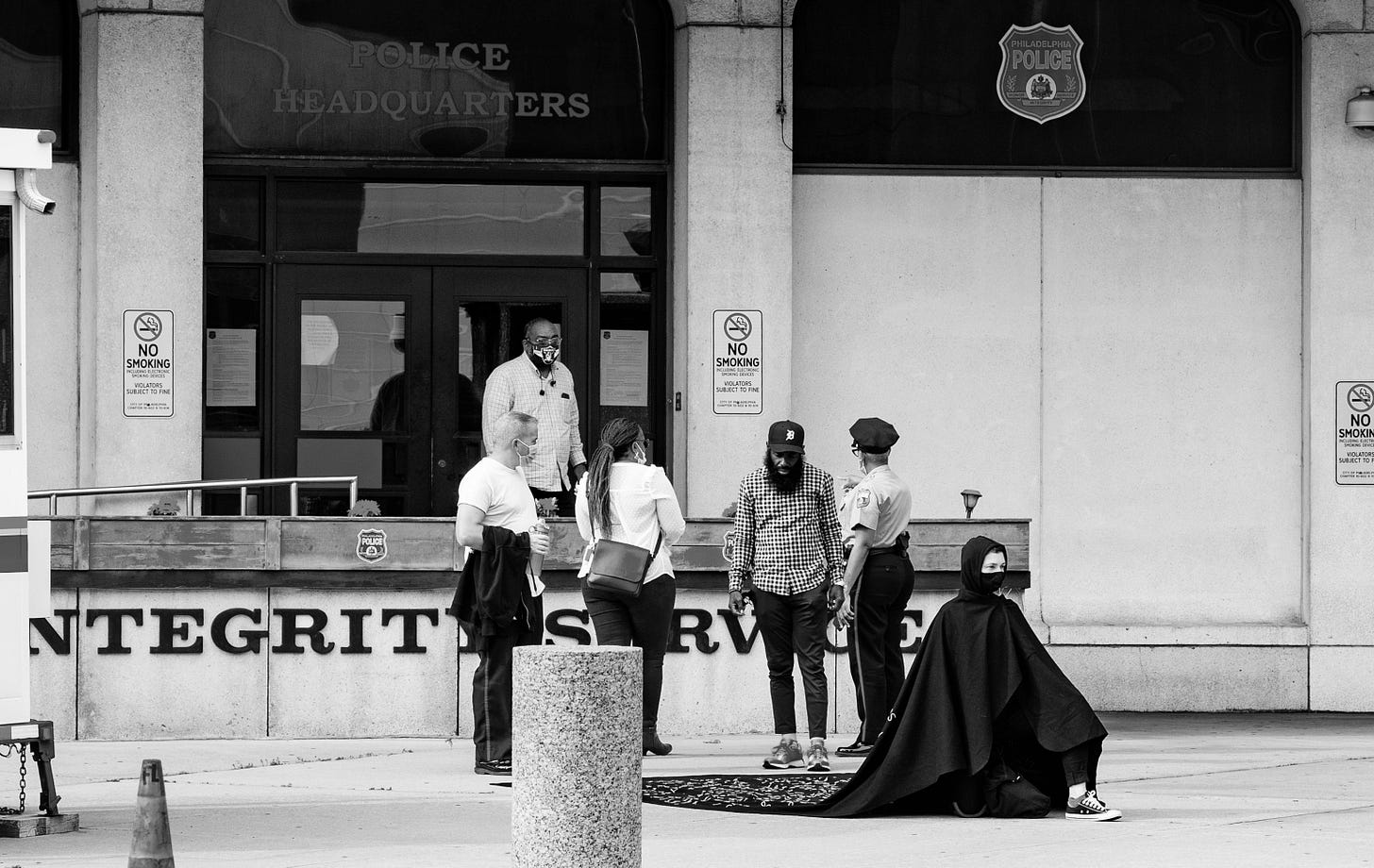

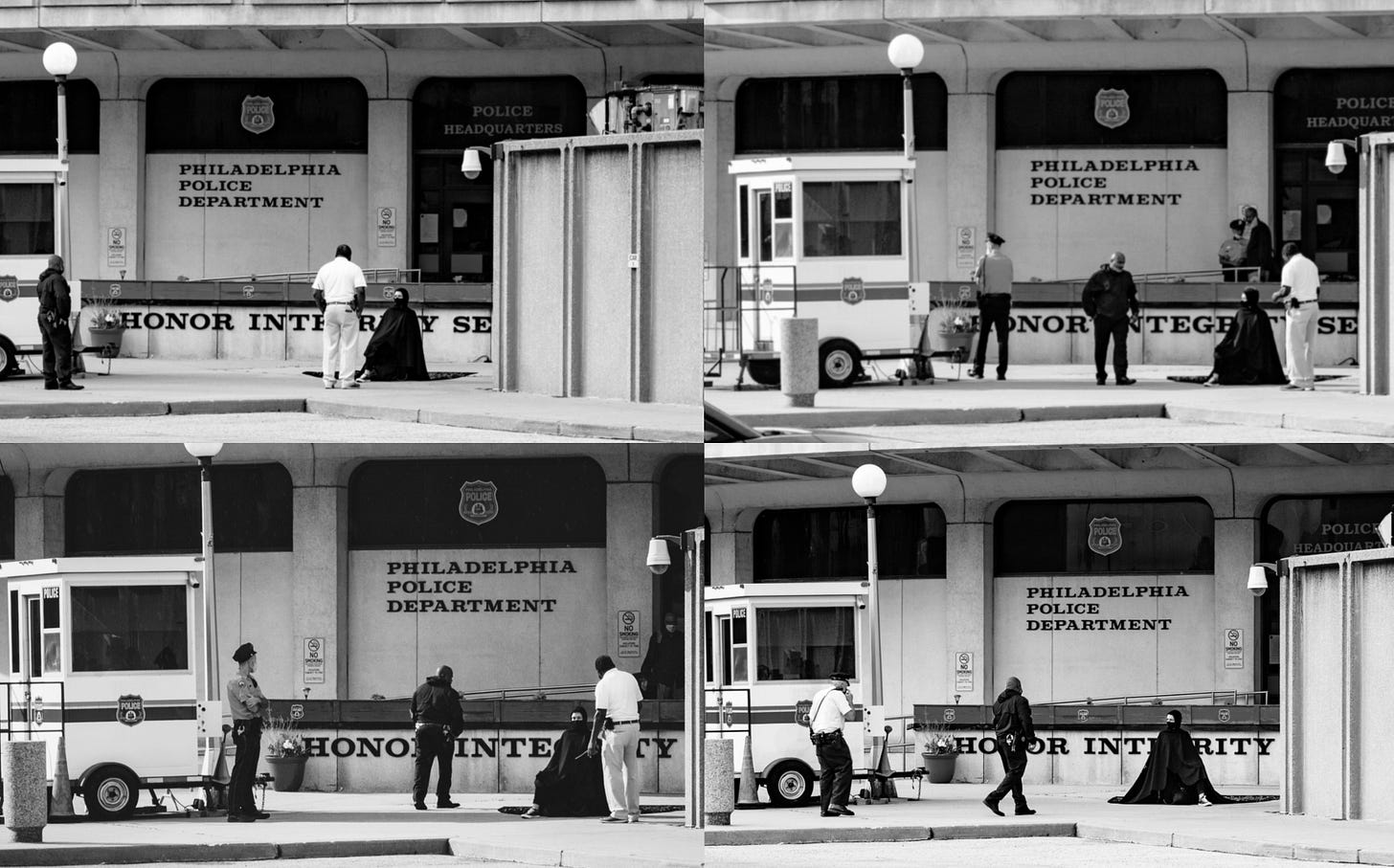

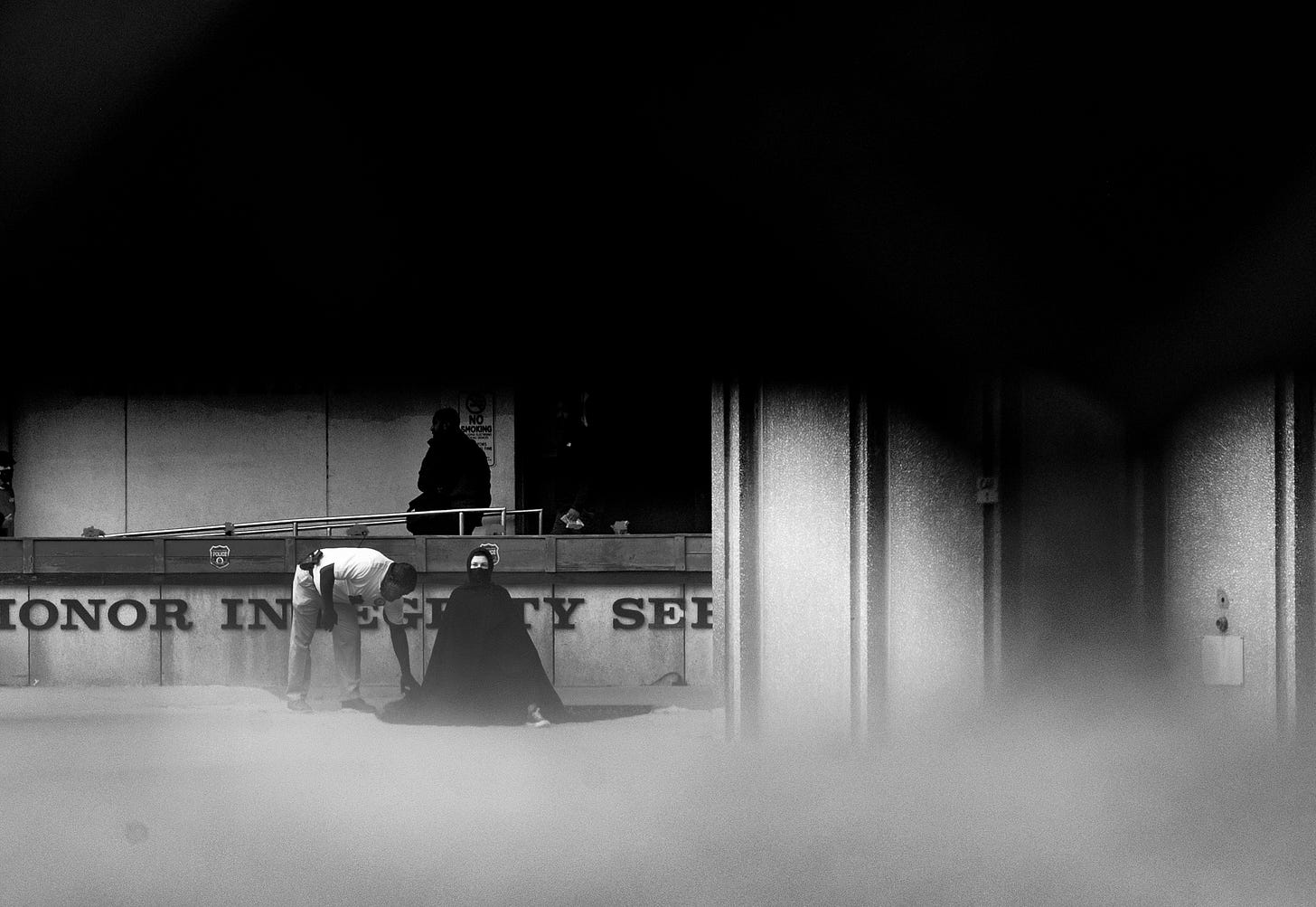
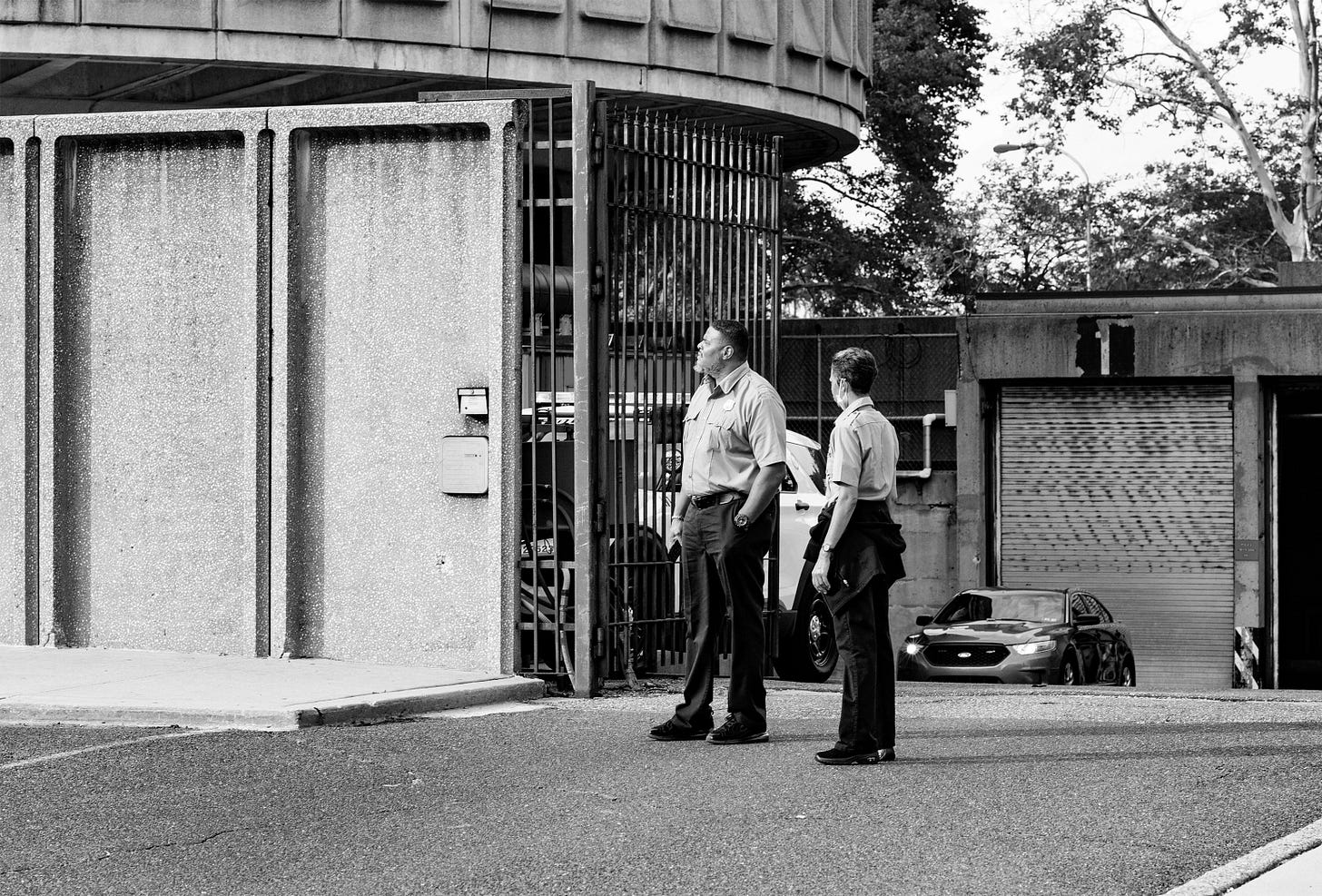


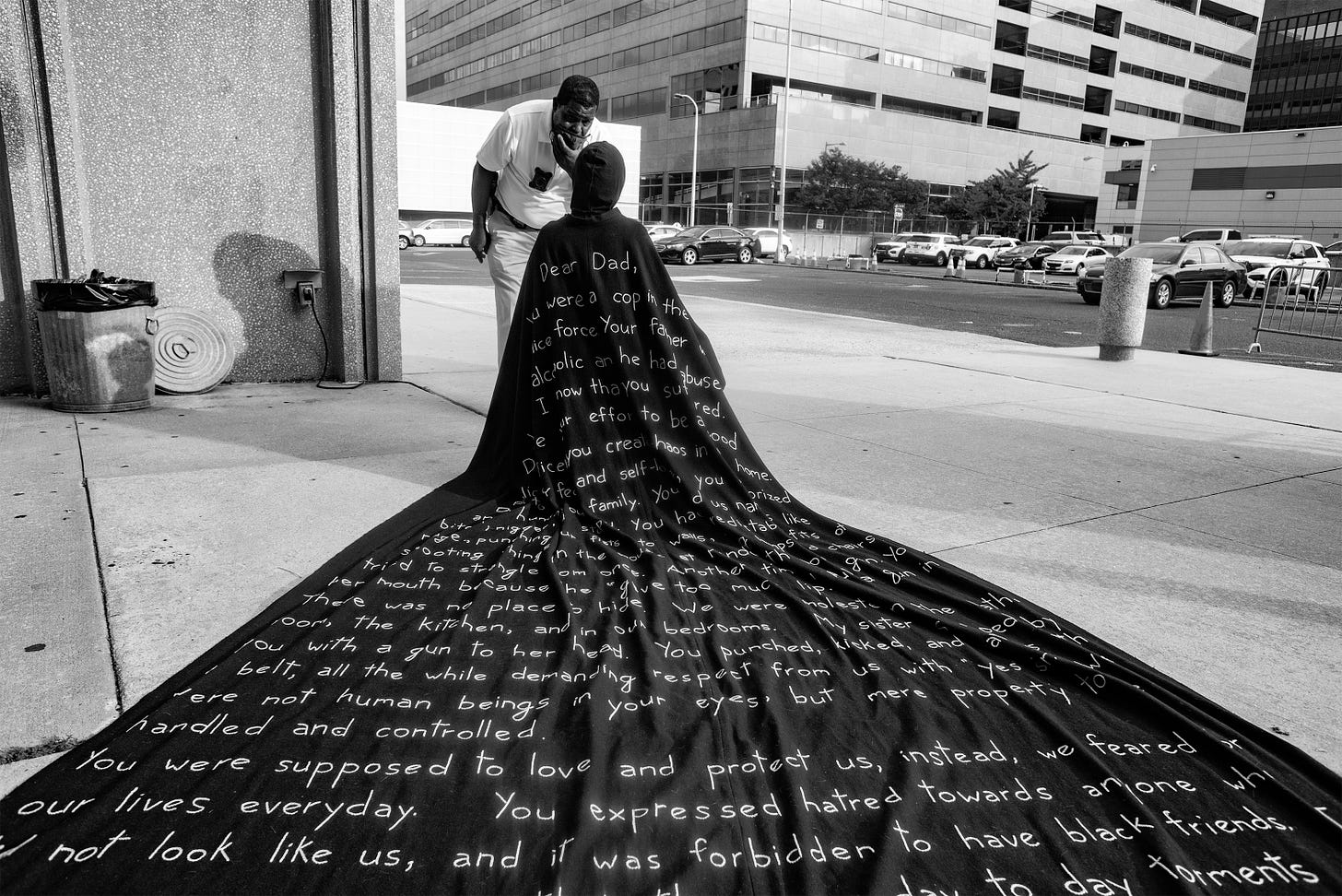
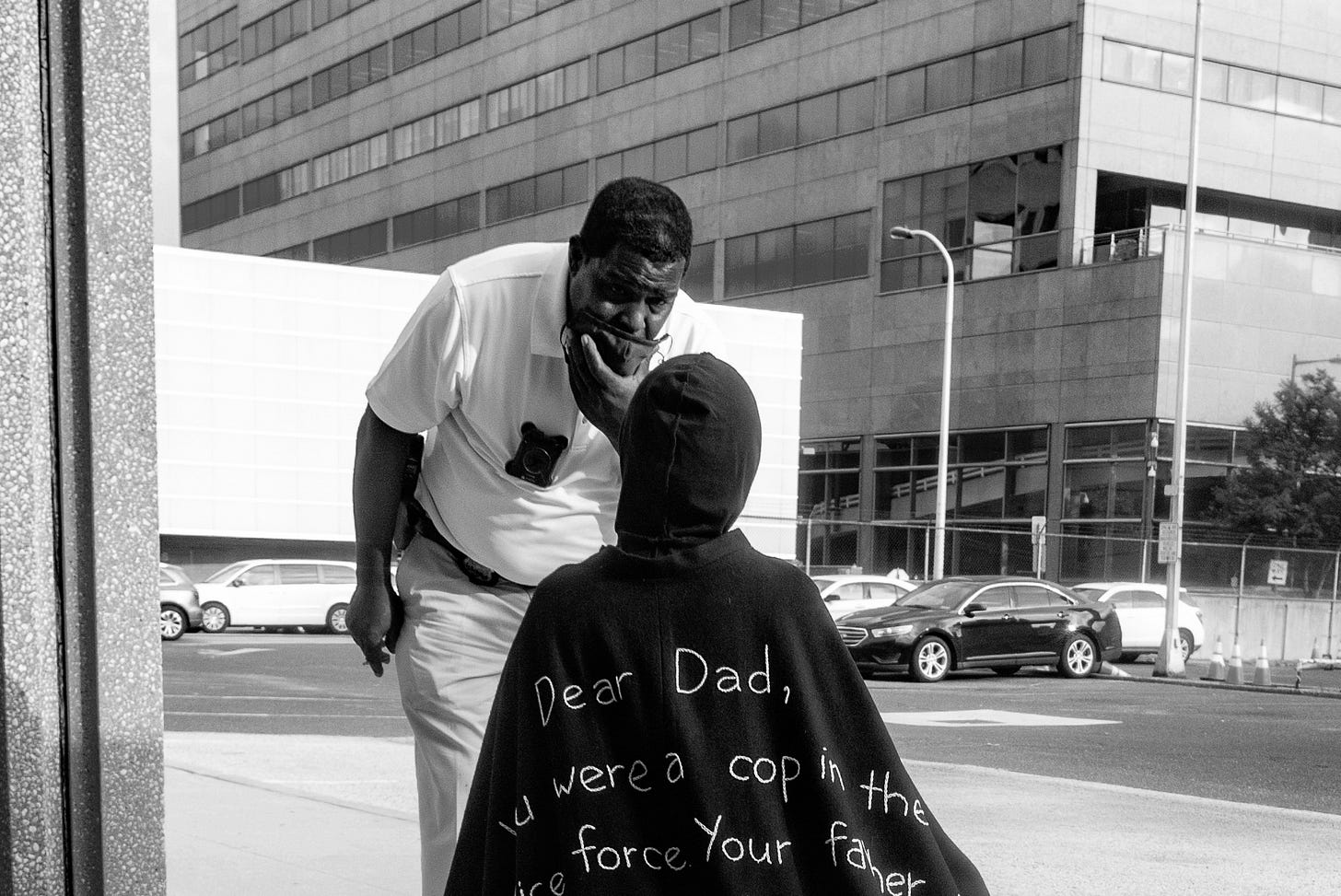
This one really moved me. Shared vulnerability. <3